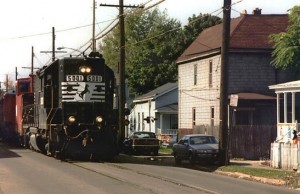death in the family…
 To bastardize Tolstoy — happy towns are all alike, and unhappy ones are unhappy in their own ways.
To bastardize Tolstoy — happy towns are all alike, and unhappy ones are unhappy in their own ways.
In Erie, Pennsylvania, where I grew up, the steel industry fueled the good times, and when it left to find a cheaper home toward the end of the ’70s, those good times gave way to recession. Left with only a polluted Great Lake to offer as an alternate attraction, Erie’s never fully recovered. Many of my friends and family members are out of work, under-employed, or collecting disability or unemployment. The lake’s beaches often close because of E. Coli levels. Its fish are cancerous. In many ways my family is representative of the people in the town — deeply generous, tough but fiercely loyal, skeptical but unwilling to ever give up.
A few weeks ago I flew back to see my relatives in Erie. On a visit with my Uncle John, or “Johnny,” as everyone in the family called him , we sat in the living room of his mother’s old house where he had always lived and watched a replay of a 10-year -old college football game, taken from ESPN’s completely unnecessary series called “Greatest College Football Games.” And, we talked about the game. Johnny never liked to talk about himself. He had suffered with polio as a child and spent two years in an Iron Lung. Besides emerging from this experience physically and mentally stunted, he also dealt with kids bullying him in school.
“This was a really good college football game,” he’d said, “this, yeah. Uh, this was a really good game.” I agreed with him, though had to admit to myself I had no memory of ever watching the game.
Shortly after I returned home from Erie I received news that Johnny had passed away. He rarely left the house, but just before he died he went to a family picnic feeling unwell. My mother said she thought her brother had come to say goodbye. Less than 48 hours after the picnic, he died in his chair watching TV of an apparent heart attack, still grasping a bottle of water by his side.
Years ago, when my wife first met Johnny, she’d commented afterward, “I could see he had a kind heart, he looked at me right in the eyes. He accepted me right away.” A stranger to my uncle, she’d reminded me of qualities he possessed that I’d somehow learned to take for granted with the passing of years. Johnny likely never had a girlfriend, he had no acquaintances and no contact with any one outside the family. It had become habit for us, or, at least me, to think of him as anti-social.
The funeral for Johnny was held yesterday. Ever since learning of his passing I have been thinking of the personality traits my wife had immediately noticed. I’ve wondered, were they enough? And for whom, us or him?
We could not afford to go back to Erie so soon again to attend the funeral. We decided against sending flowers, as sentimental gestures like this, even pity, didn’t quite feel right. I emailed my mother the sketch of a poem I’d written on my visit instead. Honestly, I don’t know that it speaks to Johnny at all. There seems so much and so little to say.
A Train Gone
Sunlight soaks the coned fruits of the sumac,
Wounds crowding a rusted train viaduct
Whose chunks have broken off in the rumble of years,
The phantom load of train cars that used to pass
Over the road, last shreds of ghost locomotion.
The heat sweating the jagged leaves,
Does it push the steel slab further along,
Little by little, like a drop of rain on a stone?
Or has this bridge built by dead men
Seeped into what surrounds it, burnishing
The earth, then the roots, the stems, leaves
And fruit with all its distresses, all its decay,
For the sun to lay bare.



